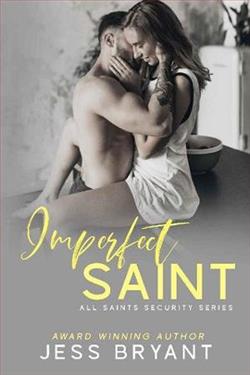Page 49 of Romancing the Heiress
“Yes, but I have to share him with Isaac. That’s my brother. But I don’t have to share with Abby. She’s too little.”
That had to be his sister. Leah couldn’t believe she hadn’t even known those children existed. But then she didn’t correspond with anyone here and only exchanged the most benign, simple letters with her sisters once a year at Christmas. They’d never mentioned Barnabas’s children, just their own, not that Rebecca had any.
“I am delighted to meet you, Jacob.” She’d thought she was so much happier without her family, but seeing this boy, she wished things were different. “Would you mind escorting me inside and letting your father and grandparents know I’m here?”
“Do you really want to see Grandmother?” he whispered, his blue eyes darting toward the house. “I try not to bother her.”
That made perfect sense. Leah had no wish to inflict discomfort—or worse—on the boy. Leah was suddenly filled with a terrible rage. If she so much as thought of hurting this precious child, Leah would do whatever it took to get him away from her. “Just fetch your father for me.”
“He’s with the milk cows. But I can escort you inside first.” He straightened and offered Leah his arm.
“Such a gentleman,” she said with a smile, putting her hand on his arm. “I’m so glad to have met you, Jacob.” He’d somehow managed to ease her nerves—a truly remarkable feat.
Jacob took her to the door and opened it, but he didn’t go inside.
She thanked him, and he dashed off the way he’d come, Hal running at his heels. Tentatively, Leah stepped over the threshold, her body coiling with tension as soon as the familiar smell of her mother’s cooking assaulted her. There would likely be a stew boiling, as there’d been most days.
The stairs led up straight from the entry hall, with the dining room to the left and the reception room to the right. Leah hesitated. They’d never been allowed in that room. It was to be kept pristine, ordered and clean, in the event they had to receive visitors. The vicar was the only person who dared venture to Black Sheep Farm. Her mother’s lack of hospitality was well known, as was her general disagreeable demeanor.
“Blast, who left the door open? I can feel the draft all the way in the kitchen!” Her mother’s booming voice carried through the house, and Leah started toward the door, which was, indeed, ajar. How had she forgotten to close it? There would be no dinner and perhaps not even breakfast.
No, that wasn’t her life anymore. Leah closed the door and tried not to shake as her mother, Harriet Webster, came down the corridor to the left of the stairs. The woman stopped abruptly, her gaze sweeping over Leah and her face pinching. The lines around her mouth had grown more pronounced. And her hair was almost completely gray. It also seemed thinner. She seemed thinner too, but she’d always been reedy.
“I can’t believe my eyes,” Leah’s mother—Harriet, which Leah suddenly decided was how she’d think of the woman from now on—said coldly. “You look like a London trollop.”
Leah glanced down at her modest walking dress. “This isn’t what trollops wear.”
“You would know.” Harriet had started casting her in the role of a fallen woman sometime around the age of seventeen, despite there being no evidence to that fact. She’d said that if Leah wasn’t yet, she would be, that it was in her blood.
“I can’t say that I’ve ever met a prostitute. If you recall, I’ve spent the majority of my time since leaving here as companion to the wife of a baronet.”
“Can’t imagine why you bothered coming back where you aren’t welcome.” She’d said that to Leah when she’d left:“You think you’re lucky, but you’ll fail at this as you do everything else, and you’ll soon be scampering back here begging for a handout. You will not be welcome.”
“I’d hoped—” What had she hoped for? There was nothing Harriet could give her that she wanted. Even if the woman threw herself to the floor and begged Leah’s forgiveness, Leah didn’t think she could bring herself to care. In that moment, she knew what she needed to do in order to free herself from the torment of her past. It wasn’t about anything Harriet could do. It was entirely within Leah’s own power to heal. The family she wanted, the connection she wished for could be hers, if she could trust in herself and those around her, especially Phin.
Leah no longer wanted the weight of the past, of things she couldn’t change. “I’d hoped you might feel remorse, but I don’t need you to do that. I just want to be free. So, I forgive you for your treatment of me. I can only imagine how difficult it was for you to take in your husband’s bastard.”
Leah’s real mother had died in childbirth, and since Harriet still had milk from her last child—Rebecca—Leah’s father had convinced her to care for Leah. Then he’d somehow persuaded Harriet to allow Leah to stay in their household where she was part of their family, but not.
Harriet’s lip curled. “You dare think I want your grace?”
“No. It isn’t for you,” Leah added in a whisper.
“Leah, is that you?” Her father, Monty Webster, rushed through the reception room. He must have been in his study, which sat in the back corner of the house. His face brightened when he saw her. His hair had gone completely white, and he wore spectacles, which he whipped off his nose. “Let me look at you. What a beautiful woman you’ve become. That costume suits you.” He moved toward her, and she was afraid he was going to try to embrace her.
He must have seen her reaction—that she didn’t want him that close—and planted his feet firmly. “How wonderful that you’ve come, though I’m surprised since you didn’t respond to my letters.”
“You’ve been writing to her?” Harriet demanded.
Leah ignored the woman in favor of what her father had just said. “I never received any letters.”
His cheeks pinked. “I confess I only started writing them within the last year. I sent them to Lady Norcott’s address.”
“That must be why I didn’t see them. She died nearly a year ago.”
“I’m sorry. I didn’t know.” He clasped his hands, his features creasing. “I was a coward, Leah. Afraid to stand up for you when you were under this roof and afraid to write to you after you left. I imagined you were happy and relieved to be away from here, and I didn’t want to disturb you. Or perhaps I thought I deserved to live with my guilt.”
“What about what I was living with?” Leah asked softly.















